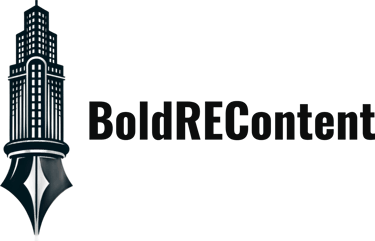6 Questions to Ask When Hiring a Commercial Real Estate Content Writer for Your Firm
Hire the best commercial real estate content writer for your firm by asking these 6 questions. Learn why it's important to be intentional and strategic when hiring a commercial real estate content writer.
REAL ESTATE CONTENT WRITING
Agnes A. Gaddis
5/19/20257 min read
The commercial real estate market has become more complex and competitive as office space performance varies, CCIMs adopt AI technology, and tenant preferences shift.
If you think you can produce generic content and get results in CRE, think again.
You need good thought leadership content from experts or commercial real estate content writers who understand the industry.
Commercial real estate has industry nuances (financial metrics, market trends, and regulations) that make it unique. Its audience prioritizes analytical content—such as investment ROI, economic forecasts, and more—over generic real estate content.
In this article, I will discuss the crucial questions to ask a content writer, the ideal answers to expect, and potential red flags when hiring a commercial real estate content writer.
These questions will save you from the potential pitfalls of hiring a generalist or unqualified writer (such as producing content that misses the mark with your target audience, hurts your brand’s reputation, and wastes your marketing resources).
The 6 Essential Questions to Ask Your Potential CRE Content Writer
Finding the right commercial real estate content writer is more than hiring someone who can write. You need an expert who deeply understands the industry and can position you as a thought leader.
Here are 6 essential questions to ask a content writer you’re considering for your CRE firm.
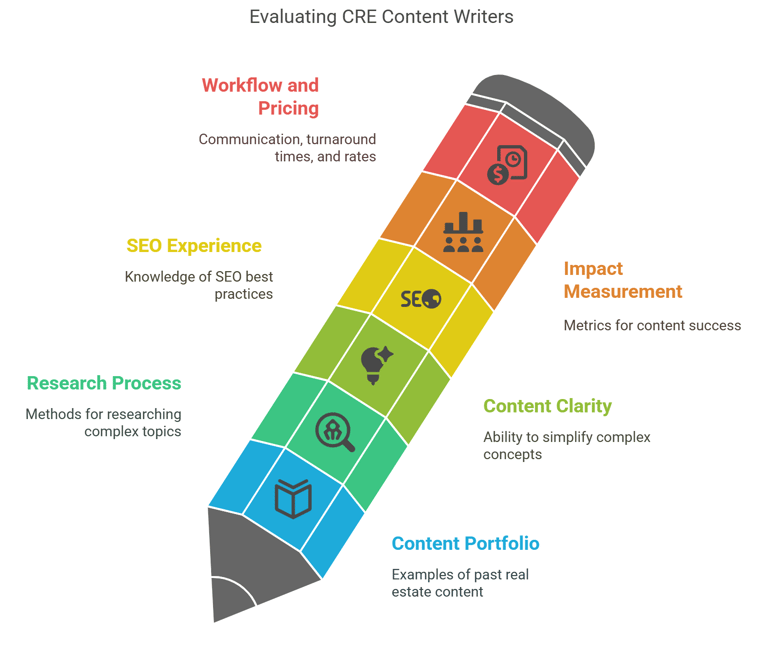

Question 1: "Can you share examples of commercial real estate investing content you've written?"
When you're hiring a writer for CRE content, you want to see that they have at least three CRE content samples.
General real estate writing samples or property descriptions do not prove that they understand the investment side of real estate.
So you need to dig deeper to find samples that show that they can write on complex financial concepts, analyze markets, and explain the legal regulations specific to commercial real estate investing. This is a critical step in assessing the work of a content writer in this specialized field.
Green flags: The writer must have samples on real estate investing. Much better if they have commercial real estate investing samples that touch on topics like commercial real estate asset classes, investment concepts (such as core, core plus, and value add), and industry trends. It should also show their ability to break down complex investment topics into simple, understandable formats.
Red flags: If they can only provide residential property descriptions, home buying/selling blog posts, or general B2B marketing articles instead of actual real estate investment content, it is a red flag. Their inability to go beyond general real estate or share relevant samples shows they are likely not the right fit for your firm.
Question 2: "Describe your process for researching complex CRE topics. What sources do you typically rely on to ensure accuracy and depth?"
When you ask about their research process and sources, you gauge their ability to write accurate, in-depth content.
Understanding their research method is key to knowing how they select their sources and the accuracy of their data.
This question is crucial because your target audience often includes financial and industry experts with deep knowledge of commercial real estate.
Green flags: A good candidate will outline a clear research process and mention reliable sources like government data (US Census Bureau), industry reports (GlobeST), and interviews with subject matter experts. They prioritize strong, credible sources over general web searches and Wikipedia.
They also evaluate the data from those sources by checking the publication’s date and reputation, plus potential biases.
Red flags: If your writer cannot mention one or two relevant sources of specialized real estate data (e.g., CoStar, CBRE, JLL Reports, John Burns, Commercial Property Executive, The Real Deal), it is a huge warning sign for you.
If they offer a vague answer like “I use Google” and over-rely on news articles (some news publications lack credibility), that’s a red flag.
Question 3: "How do you approach translating complex financial or market concepts (e.g., cap rate compression, IRR, 1031 exchanges) into clear, engaging content for our target audience(s)?"
CRE content involves complex financial terms. A good commercial real estate copywriter must be able to simplify those terms into easy-to-understand concepts.
By asking how they handle difficult market terms, you confirm their ability to break down concepts (like cap rate compression) without losing credibility.
Since CRE content can be complex, this question enables you to evaluate a writer’s communication skills, their understanding of the niche and audience, and their ability to explain difficult concepts to readers without oversimplifying them.
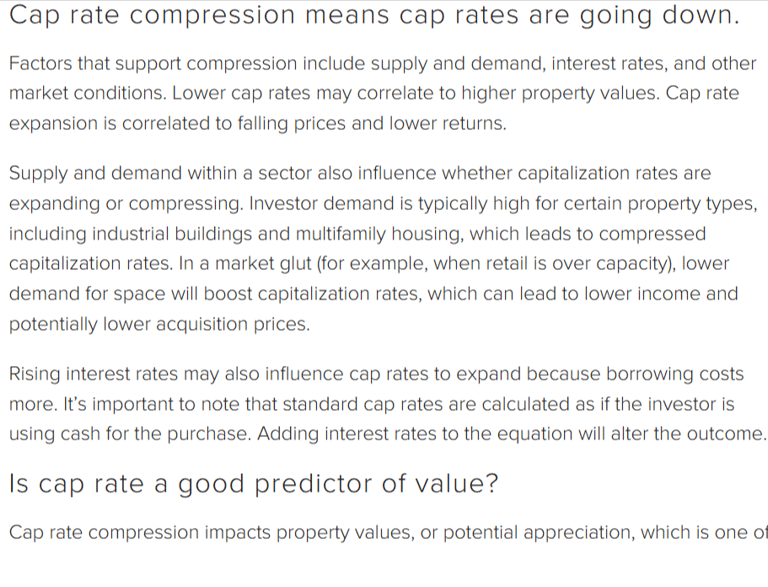

Explanation of cap rate compression - written by a generalist
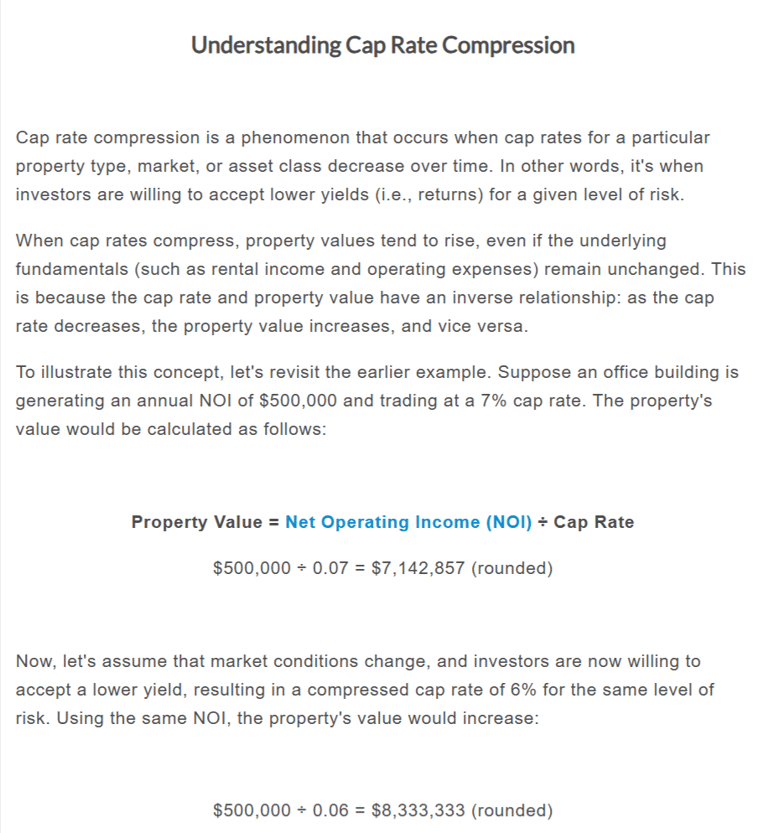

Explanation of cap rate compression - written by a specialist
Green flags: The content writer must know how to break down concepts into simple terms. Whether it is for a beginner investor or a seasoned veteran, they should be able to use analogies, examples, or clear explanations to simplify difficult terms.
They should focus on the “so what?" of a concept and how it affects investors.
Red flags: Be careful of writers who don't go beyond defining technical terms. That is, writers who give you back a definition of a CRE topic or focus on jargon without discussing its real-world significance or why your audience should care.
Question 4: "What's your experience incorporating SEO best practices?"
The best commercial real estate content writers understand that commercial real estate SEO is specific/hyperlocal and involves long-tail keywords.
When you ask about their SEO expertise, you ascertain whether your writer understands the importance of content structure and using long-tail keywords naturally in their writing. You also gauge if they can write to address user intent.
When you hire a writer who understands SEO, it’s easy to make your content discoverable by search engines and the right audience.
Green flags: They talk about key skills like keyword research; mention search volume, competitive research, and tools like Semrush and Ahrefs while describing their process.
They also talk about the importance of creating content that genuinely satisfies user search intent instead of resorting to things like keyword stuffing.
Your writer should also understand the technical SEO aspects of content creation (internal linking and headings).
But importantly, don't just take their word for it. They should be able to point you to some of their published works that currently rank on search engines.
Red flags: Don't settle for someone who thinks SEO is all about keyword stuffing. Also, do not hire them if they downplay SEO’s importance or claim it’s “dead” or not relevant to their type of writing. Google still controls a large bulk of the search market share (79%-89%). This means that for now, SEO is definitely not dead.
Question 5: "How do you measure the success or impact of the content you create? How do you see your work contributing to the business goals of a real estate investment firm?"
Most writers write, but not every writer can write in a way that contributes to ROI.
The best commercial real estate content writer for your firm would be someone who knows how to consistently produce high-quality content. Yes. But they should also be able to approach projects with a strategic mindset.
They should be able to see the big picture and understand how each content piece might contribute to lead generation, investor confidence, brand building, etc.
You need someone who understands how their work could directly impact your bottom line and business goals.
These kinds of writers know how to add relevant, converting CTAs at the end of their content pieces.
They also offer useful suggestions on content direction and strategy. This is what distinguishes a truly valuable content partner from a basic real estate writing services provider.
Green flags: A good CRE writer should be able to discuss relevant metrics like engagement, time on page, lead conversions, keyword ranking, and organic traffic.
They should be able to explain how their content pieces will achieve specific goals for real estate firms, for example, lead generation, differentiation, and an increase in traffic.
This shows that they are concerned about the success or impact of their content.
They should also ask questions about your specific goals for creating content.
Red flags: Be wary if they discuss word count or the number of articles without mentioning how relevant metrics like engagement and dwell time are important.
They are probably a bad fit if they can’t sell you on how their content leads to brand awareness or lead generation.
Question 6: "What is your typical workflow, including communication, turnaround times, and revision process? What are your rates or pricing structure?"
When hiring a writer, you must understand how they work and how fast they can deliver to know the practicalities of working together full-time or part-time.
You need a clear picture of their operational side (price, timeline, revision process, communication speed, and more) to see if it aligns with your expectations and budget.
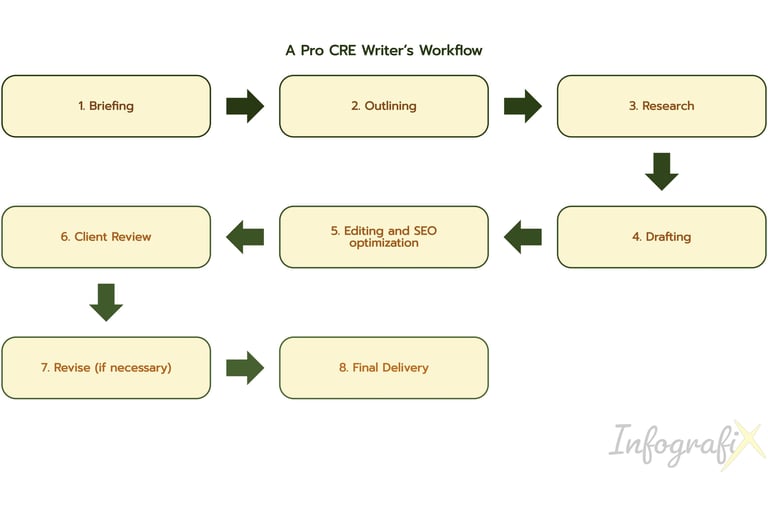

Green flags: You want to hire someone who's organized. They should be able to explain their process clearly from initial briefing by the client to how they handle revisions (if any).
They should also give a realistic turnaround time (2-5 days for a 1,000-word well-researched and well-written article) and a clear pricing structure (per project, hourly, or retainer) - with clear justification.
Red flags: Avoid writers who provide cryptic or inconsistent answers when asked about their workflow.
For example, if their pricing isn’t clear or they cannot clearly explain their process, they may not be the right fit for your business.
You should also be wary of unrealistic turnaround times (e.g., 4-5 hours) or inflexible revision policies.
Plus, if the writer takes too long to respond to messages, even on their preferred communication channel, it is a sign that they lack the professionalism you need from a CRE writer.
Conclusion
Hiring a commercial real estate content writer isn't just about finding someone who can write well. When you find the right commercial real estate content writer, that's a strategic investment that will benefit your firm for years.
So you have to go beyond generic HR vetting and ask questions that probe their industry knowledge and ability to think strategically.
You have the option to choose a generalist to cut costs or just generate articles with AI and slap them on your site with little edits, but you'd get meager results from content marketing if you took that route.
Working with a specialist real estate content writer will save you time and help you attract those sophisticated, high-value investors you're trying to reach.
Want to hire a commercial real estate content writer? See this list of seven best real estate content writers.


Agnes Gaddis is an experienced real estate content writer, helping residential real estate investing brands boost traffic and visibility through content. You can read her articles on SparkRental, Inman, Bankrate, RealWealth, Credit.com, and more.
Contact
agnes (at) boldrecontent.com
Top-notch content marketing solutions for real estate investment firms
